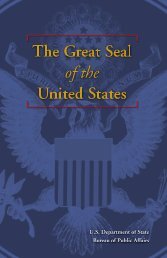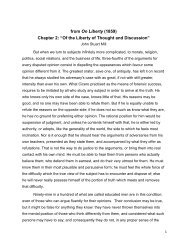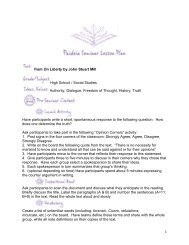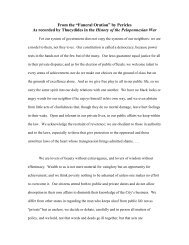Rousseau_contrat-social
Create successful ePaper yourself
Turn your PDF publications into a flip-book with our unique Google optimized e-Paper software.
assemble and do what the comitia curiata should have done.<br />
The division by centuries was so favourable to the aristocracy that it<br />
is hard to see at first how the senate ever failed to carry the day in<br />
the comitia bearing their name, by which the consuls, the censors and<br />
the other curule magistrates were elected. Indeed, of the hundred and<br />
ninety-three centuries into which the six classes of the whole Roman<br />
people were divided, the first class contained ninety-eight; and, as<br />
voting went solely by centuries, this class alone had a majority over<br />
all the rest. When all these centuries were in agreement, the rest of<br />
the votes were not even taken; the decision of the smallest number<br />
passed for that of the multitude, and it may be said that, in the<br />
comitia centuriata, decisions were regulated far more by depth of purses<br />
than by the number of votes.<br />
But this extreme authority was modified in two ways. First, the tribunes<br />
as a rule, and always a great number of plebeians, belonged to the class<br />
of the rich, and so counterbalanced the influence of the patricians in<br />
the first class.<br />
The second way was this. Instead of causing the centuries to vote<br />
throughout in order, which would have meant beginning always with the<br />
first, the Romans always chose one by lot which proceeded alone to the<br />
election; after this all the centuries were summoned another day<br />
according to their rank, and the same election was repeated, and as a<br />
rule confirmed. Thus the authority of example was taken away from rank,<br />
and given to the lot on a democratic principle.<br />
From this custom resulted a further advantage. The citizens from the<br />
country had time, between the two elections, to inform themselves of the<br />
merits of the candidate who had been provisionally nominated, and did<br />
not have to vote without knowledge of the case. But, under the pretext<br />
of hastening matters, the abolition of this custom was achieved, and<br />
both elections were held on the same day.<br />
The comitia tributa were properly the council of the Roman people. They<br />
were convoked by the tribunes alone; at them the tribunes were elected<br />
94











